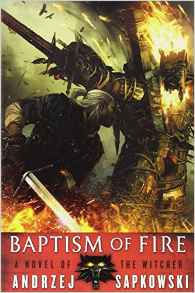Andrzej Sapkowski’s novels of the Witcher, Geralt of Rivia, came late to the English-speaking world. Baptism of Fire, the third novel in a long narrative about Geralt, about wars overwhelming the world that he knows, and about a child of prophecy, was published in Poland in 1996. It was published in English in 2014, by which time editions had already appeared in Czech, Russian, Spanish, Lithuanian, German, French and Serbian. The series’ fifth (and presumably final) book will appear in English in 2017, nearly 20 years after its initial publication. I was introduced to Sapkowski’s writing in 2012 by a Russian friend, who was surprised that such a big-name author was practically unknown in my language. For someone like me who is used to thinking of English as the most important language for fantasy literature, it’s odd to feel so late to the party. But that may be the way of things in the 21st century. Kid Three is reading (in German) the fourth book in a fantasy series by Italian author Silvana De Mari; only one of them has appeared in English.
Baptism of Fire is a middle book that does not seem to be aware there is such a thing as a middle-book problem. Sapkowski continues the wars that were set in motion The Time of Contempt. Geralt, a classic fantasy loner-hero finds that in a war-torn land, even a preternaturally gifted fighter is no match for big battalions. Over the course of the book, an unlikely company accretes around him. The scrapes that they get into and out of, and the interactions of the lively personalities — from the irrepressible poet Dandelion to the unlikely scholar Emiel Regis or the several dwarfs and gnomes in a merchant band — bring out the fun in their adventures. The action is both fun and tense. The non-titular characters are all in real danger over the course of the book, and Sapkowski has shown in previous books that he is willing to harm his hero as well, so there are no guarantees that anyone will escape a tight situation unscathed. The characters refuse to be weighed down by the dangers that beset them, adding humor and life even in the direst of straits.
The background, though, is far from jolly. Sapkowski was born in Poland not long after the end of World War II. He would have seen the effects of its devastation all around him, and all of the adults he knew as a young person were survivors of that terrible conflict in one of its most brutal theaters. The war through which Geralt moves draws on World War II and older conflicts in Polish history, notably the Swedish invasion known to Poles as Potop, the Deluge. Bodies of troops range back and forth across the land; one’s own side can be as bad for civilians as notional opponents; the military situation is often unclear, with uncertainty increasing the chances of sudden death. Within this maelstrom, Geralt is seeking the young woman Ciri, of whom prophecies speak. Sapkowski shows her intermittently, riding with bandits and increasingly gaining a taste for fighting and killing for their own sake. There is plenty of fire for these baptisms, but it is not clear that there is any grace at all.

